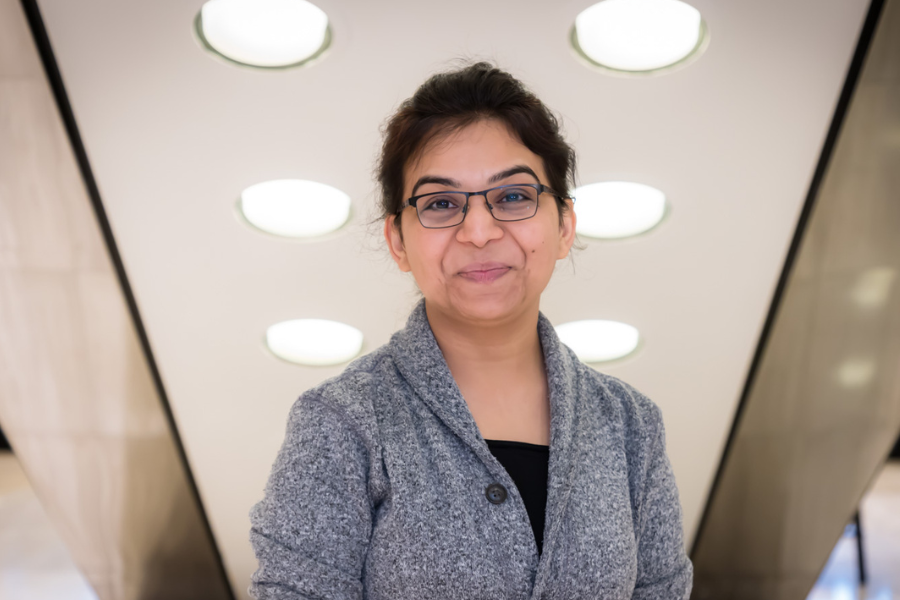Rupal Hatkar is recognized for leadership

Rupal Hatkar is a PhD candidate in the Department of Laboratory Medicine and Pathobiology in the Temerty Faculty of Medicine. She has been named as one of the 18 Temerty Medicine learners recently announced as recipients of the 2023 University of Toronto Student Leadership Award (UTSLA).
The awards recognize students in their final year of study from across the university for their outstanding student leadership, volunteer service and commitment to U of T.
As Co President of CLAMPS, the LMP Graduate Student Union, for the second year in a row, Rupal is no stranger to leadership. She tells us more in our Q&A.
What have you been investigating in your PhD?
I am a member of Dr. Adam Shlien’s Lab at SickKids. During my PhD, I have been characterising the genetic landscape of Radiation-associated Angiosarcoma (RAAS), which is a highly aggressive malignancy, typically occurring 5-10 years after the treatment of breast cancer with radiation therapy. I have also been investigating Sporadic Angiosarcoma (SA), a primary tumor that often arises in UV-exposed areas such as the scalp and face but may arise anywhere in the body.
I am exploring the spatiotemporal emergence of driver variants and mutational processes responsible for introducing the drivers in RAAS and SA, which lay the foundation for the discovery of biomarkers for early detection. This may also help with the development of new tumor-specific therapeutic drugs to improve progression-free survival for these patients.
After finishing my PhD, I plan to study medicine, keep pursuing research during medical school and residency, and eventually practice as a clinician scientist.
Why do you think demonstrating leadership and volunteering is important for students?
It is important to participate in different activities and initiatives as it gives us opportunities to meet and collaborate with, students, faculty members, different departments within U of T, and the general population to understand issues where we can make a difference. Collaboration and hosting events help students become empathetic towards others, understand multiple perspectives, and improve decision-making skills.
What activities or initiatives have you been involved in?
As a member of CLAMPS, I have been making efforts to survey LMP students and propose solutions to the department. I’ve also suggested and planned different social, sports, and outreach events with CLAMPS members for LMP students to foster and enhance their sense of community within the department. Events include the REACH high school outreach event and the LMP Research Day and Product Show. I was Vice President Communication in the first two years of my PhD, then Co-President for my third and fourth year which has been an incredible experience.
As a president of the U of T Stem Cell Club, I have been collaborating with many groups on campus and across Canada as well as health professionals to run different campaigns, such as South Asian Donors Save Lives and Black Donors Save Lives to increase awareness about the importance and need of stem cell donors from ethnically minor groups to increase their representation on the Canadian Stem Cell registry.
I also lead the Saving Lives with Pride Campaign to educate members of the LGBTQ2+ community about their eligibility to register and donate stem cells to save lives of patients suffering from different blood cancers and blood disorders. I also train members of the U of T Stem Cell Club to become advocates to raise awareness and recruit stem cell donors from all ethnic backgrounds.
What has been a highlight for you in doing this and why?
I have really enjoyed my advocacy roles. A big highlight for me was working with the department of LMP in 2019 to review the graduate curriculum and make changes to the credits needed.
I also represented LMP students, along with student groups of other departments, about raising the graduate student stipends to meet the cost of living in Toronto, which is now being implemented.
I’m also really proud to be one of the founding members of the LMP Mentorship Council and contributing to the development of the graduate student mentoring program which matched 44 students to upper-year graduate students or alumni mentors this year.
My work in raising awareness about the need for stem cell donors and recruiting around 3,000 donors from different ethnic backgrounds who could potentially help save the lives of many patients suffering blood disorders has been incredibly rewarding.
All these activities help me be a better scientist too as I have become more patient and can analyse situations from all possible perspectives in a collaborative scientific environment.
How do you feel about receiving the UTSLA leadership award?
I was extremely excited, honoured, and appreciative to receive the award, and, of course, grateful to everyone who gave me opportunities to make contributions as a member of the LMP graduate student council and U of T Stem Cell Club.
We were all invited to an in-person event to receive the award. This event was very joyous and informative. I got to meet fellow U of T students from different Temerty Medicine departments who had also won this award for their incredible contributions. I also got a chance to meet the Dean of the Faculty and get insightful advice about the importance and significance of leadership in the academic and non-academic parts of our lives.



